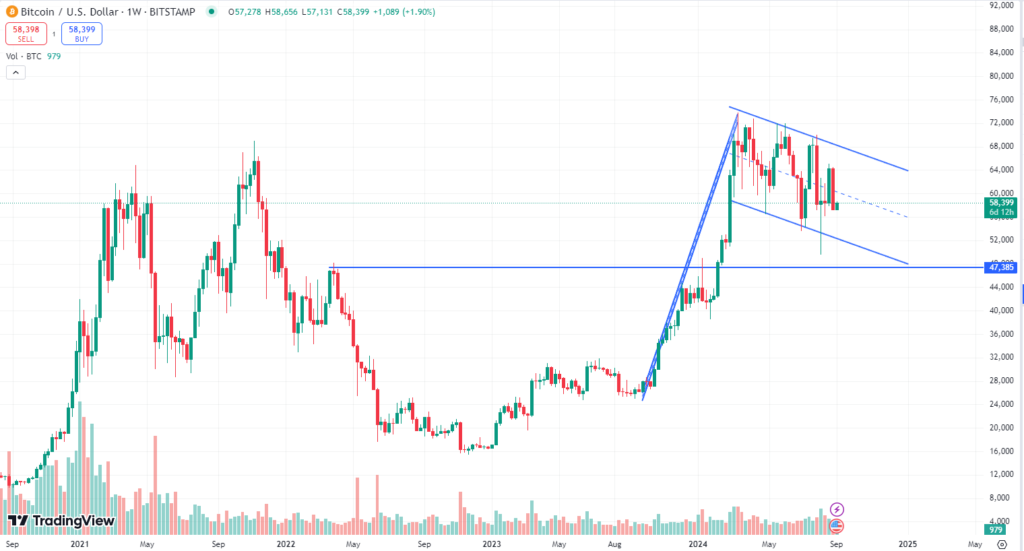Bitcoin for International Deals
Russia is steering its foreign trade in a new direction by using Bitcoin as a payment method for cross-border transactions—a daring and unexpected step. This calculated move represents a dramatic change in the global financial scene and might completely alter the way that countries do business with one another. Russia is leading a financial revolution that is upending established systems, and this decision comes amid escalating geopolitical tensions and economic sanctions.
The Dawn of a New Financial Era
More than just a splashy headline, Russia’s move to use Bitcoin for cross-border trading heralds the start of a new era in finance. Russia is searching for ways to get beyond the inflation, currency depreciation, and restrictive economic policies that many other countries are facing. Through the use of Bitcoin, a decentralized digital currency, Russia hopes to become more financially independent and less dependent on the US dollar. Stockedz.com
Why Bitcoin? The Benefits of Cryptocurrency in International Trade
Bitcoin is a decentralized asset that provides several benefits for global trade, making it more than just another cash.
- Decentralization: Since Bitcoin is not governed by a government or central bank like other currencies are, there is less chance of sanctions or freezes.
- Transparency and Security: Bitcoin is based on blockchain technology, which makes transactions transparent, safe, and irreversible. This increases trade partner confidence.
- Lower Transaction Costs: Conventional overseas transfers can entail substantial costs. Transactions using Bitcoin can drastically cut these expenses, offering a more affordable option.
- Speed and Efficiency: With Bitcoin, cross-border transactions may be finished in a matter of minutes as opposed to days, which enhances cash flow and efficiency.
Russia’s Strategy: Circumventing Sanctions and Boosting Trade
Russia is primarily using Bitcoin to transact internationally to get over financial sanctions imposed by Western nations. Russia’s economy has been impacted by these sanctions, which have limited its access to international financial markets. Russia hopes to get over these limitations by using Bitcoin, preserving and even enhancing its trading ties with other nations.
Furthermore, since Bitcoin is decentralized, no one party has power over it. Due to this feature, Russia can stay away from the SWIFT payment network, which has historically been utilized as a political tool. Russia is letting the world know that it is willing to look into new ways to safeguard its economic interests by embracing Bitcoin.
Potential Impact on Global Markets
Russia’s audacious approach is probably going to affect markets throughout the world. This move may be seen as a workable way forward by several nations, especially those who are suffering economic sanctions or want to lessen their reliance on established banking systems. For similar reasons, nations like Venezuela, North Korea, and Iran have already shown interest in cryptocurrency.
The Volatility Question: Can Bitcoin Handle Large-Scale Transactions?
The volatility of Bitcoin is one of the main issues with using it for international trading. Both buyers and sellers of bitcoins run the danger of seeing large price swings in a short amount of time. But Russia is ready to reduce these risks by using hedging techniques and maybe working with cryptocurrency exchanges to keep prices stable throughout trades. Bitcoin for International Deals.
Furthermore, the use of stable coins—cryptocurrencies linked to reliable assets like the US dollar—might act as a dampener on the volatility of Bitcoin and enable Russia to take advantage of blockchain technology’s benefits without having to worry about price fluctuations. Bitcoin for International Deals.
The Reaction from the West: A Mixed Bag
Not unexpectedly, Western countries and financial institutions have responded to Russia’s move in different ways. Some perceive this as a direct threat to the current financial system, while others see it as a logical development in a world where digital currencies are becoming more and more prevalent. Given that cryptocurrencies are decentralized, enforcing extra rules or sanctions on Bitcoin transactions involving Russia may be considered by the US and EU, but the process is complicated. Bitcoin for International Deals.
Could This Spark a Crypto Arms Race?
Russia’s use of Bitcoin in foreign transactions raises the possibility of a “crypto arms race” among other countries. We may witness a spike in the state-level adoption of digital currencies as more nations look into alternative financial systems to safeguard their economic interests. This tendency may accelerate the creation of digital currencies issued by central banks (CBDCs) and result in new rules and regulations governing international finance. Bitcoin for International Deals.
The Future of Global Trade: A Digital Currency-Driven Ecosystem?
Russia may be moving toward a more decentralized financial ecosystem as evidenced by its use of Bitcoin for international trade. Though the entire impact is still too soon to be determined, one thing is certain: the topic of digital currencies is starting to come up in discussions about global trade. Nations who adjust to this new reality may find themselves at a competitive advantage in the world economy of the future. Bitcoin for International Deals.

Conclusion: A Bold Step into Uncharted Waters
Russia has taken a risk by deciding to adopt Bitcoin for cross-border transactions, which might drastically alter the course of international trade. Russia is setting itself apart in the digital financial revolution by opposing the established banking systems and adopting a decentralized currency. Greater financial autonomy, lower transaction costs, and new trade prospects make this a tempting plan for Russia and possibly other countries, even with the risks and uncertainties involved. This approach might potentially bring about a new era of financial independence or encounter strong opposition from established global powers, as the world keenly monitors its progress. Bitcoin for International Deals.
FAQs About Russia’s Use of Bitcoin for International Trade
1. Why has Russia decided to use Bitcoin for international trade?
Russia wants to use Bitcoin to get over financial sanctions, become less reliant on US dollars, and become more independent financially when transacting abroad. Because Bitcoin is decentralized, Russia can conduct business outside of established financial institutions, which increases trading flexibility. Bitcoin for International Deals.
2. What are the advantages of using Bitcoin for cross-border transactions?
In comparison to conventional banking systems, Bitcoin has several benefits, including decentralization, transparency, security, lower transaction prices, and quicker processing times. It is a desirable choice for nations wishing to secure and expedite their international trade because of these advantages. Bitcoin for International Deals.
3. How does Bitcoin help Russia avoid sanctions?
The decentralized blockchain network, which is unaffected by banks or governments, is where Bitcoin transactions take place. This makes it possible for Russia to carry out transactions without depending on established banking networks like SWIFT, which may be governed by laws and regulations. Bitcoin for International Deals.
4. What are the risks associated with using Bitcoin for international trade?
That makes sense. Countries with comparable economic hardships or restrictions, such as Venezuela or Iran, would consider using Bitcoin or other cryptocurrencies to facilitate international trade. This trend might get more pronounced if acceptance of digital currency increases. Bitcoin for International Deals.
5. Will other countries follow Russia’s lead in adopting Bitcoin for trade?
That is conceivable. Nations like Venezuela or Iran that are subject to similar restrictions or economic difficulties should think about utilizing Bitcoin or other cryptocurrencies to help with international trade. As the acceptance of digital currencies grows, this trend may intensive. Bitcoin for International Deals.







